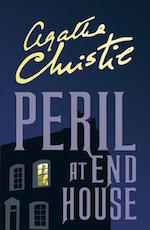
Poirot Score: 85
Peril at End House
☆☆☆☆☆
Reasons for the Poirotscore
The plot is extremely well clued, and fair. It is one of a few ‘whodunnit’ mysteries, mostly written by Christie, that when readers hit on the correct solution they cannot think of an alternative that answers all the questions. Balanced with this, it is not an easy solution; the great Hercule Poirot is taken in himself, so the reader feels justifiably smug. There is also humour and kindness in equal measure to balance the evil.
Click here for Full Review (spoilers ahead)
Trivia
Dedication: To Eden Phillpotts
To whom I shall always be grateful for his friendship and encouragement he gave me many years ago
Eden Phillpotts (1862 – 1960) was a writer, and friend of the Miller family. He was born in India, but educated in Plymouth, Devon. In 1908, when Agatha Miller (Christie) was 18 yrs old, she wrote a 6,000 word story when bored, recovering from influenza, called ‘The House of Beauty’ about madness and dreams. It was eventually published in 1926. She sent the work to Eden Phillpotts, who wrote back advising her to cut out the authorial voice moralising, and let the characters speak for themselves. Christie, ever after, heeded his advice. Christie, like Shakespeare, presents characters and their actions without adding authorial comment, and allows the reader to make up their own mind.
Looe, Cornwall
Looe in Cornwall: the beach
This book is set in mythical St Loo on the Cornish riviera. This may be based on the lovely fishing village and tourist destination of Looe, on the South Cornish coast.
Aviation:
The first aerial circumnavigation of the world was in 1924 by a team of American pilots.
In 1928 Australian Charles Kingsford Smith was the first person to fly across the Pacific to Australia. In 1929 he completed the second air circumnavigation.
Archie Christie, Agatha Christie’s first husband, was one of the first British pilots, and fought in the First World War. Archie and Agatha Christie were divorced by the 1932, so it is not surprising the fictitious aviator in Peril At End House gets killed.
Wimbledon
In reply to Hastings ‘its a good thing to be an Englishman’, Poirot tartly replies it ‘consoles for the defeats at Wimbledon’. Christie was a keen tennis player. From 1877-1909 British players won every Men’s Final at Wimbledon except in 1907 when the competition was won by an Australian.
Arthur Gore (pictured) won Wimbledon in 1909,
but it was another 25 years before another British player, Fred Perry, won (in 1934-6). When Christie wrote this novel, that win was two years in the future. There was then a lifetime, a 77 year gap, until Andy Murray, a Scotsman, won in 2013.
The relationship between Poirot and Hastings:
Poirot and Hastings are clearly fond of each other, as friends ‘There speaks the good friend – the faithful dog’, but Poirot is very harsh in his criticisms of Hastings.
Almost incredible, my poor Hastings, how you hardly ever do see…. But regard, my dear old imbecile – it is not necessary to employ the grey cells – the eyes will do.
Even when Poirot thinks he is being complimentary, there is an egotistical sting in the tail:
My valet, Georges, an admirable man..has no imagination. I particularly missed your vivid imagination…One needs a certain amount of light relief.
Later in the book Poirot groaned to Hastings
You would say that! It would appeal, I knew, to your romantic but slightly mediocre mind.
The reader is shocked. We never get Hastings’ reaction, as Poirot always holds forth. One wonders why Hastings doesn’t walk out on Poirot with this constant verbal denigration.
Modern, cutting-edge references
‘The Talkies’: a phrase used by Nick Buckley.
There had been attempts to perfect synchronized sound with cinematographic film from the turn of the 20th Century, using various different approaches. Earlier films were silent, with written dialogue for the audience to follow, and a live musician playing an organ or piano in the theatre, to add a sound track echoing the mood of the film from moment to moment. It was after the commercial success of the American film The Jazz Singer in 1927 that films changed. The Jazz Singer had its European premier in London in September 1928, so less than four years before this novel was published. ‘Talkies’ were an exciting novelty in the early 1930s.
Miss Buckley also possessed:
‘A gramophone and some records lying about at End House’. Thomas Edison invented the phonograph before Agatha Christie was born in 1877. In 1925 gramophones became standardized to play records at 78 rpm (revolutions per minute). Records were made of shellac: if you dropped one it would shatter, as I vividly remember from my childhood. It was not until 1945 that vinyl records could be manufactured cheaply, slowly replacing the pre-war records. Record players were popular as a source of immediate dance music for young people, since radio programmes were often the spoken word. There were no ‘music only’ radio stations or channels until much later. The BBC Light Programme was launched in 1945 and The Third Programme (now Radio 3), playing classical music, in 1946.
Nick Buckley’s father died of pneumonia in 1919, when Nick would have been about 11 yrs old. Agatha’s own father died of pneumonia in 1901 when Agatha was 11 yrs old.
Pseudo-Australians
There is a lot of humour with the Crofts pretending to be Australian. From the ‘cooiiee’ calls to each other, presumably warning each other that dangerous strangers are approaching their secluded hideout, to the cheerful upbeat banter, and their insistence in showing hundreds of snaps of the Outback. Christie had enjoyed her trip to Australia in 1922 with her then husband, Archie Christie. The Christie’s had done a round the world tour (see the Trivia for The Man in The Brown Suit for details). Christie drew on her personal experience of exuberant, well meaning Aussies, for her vivid caricature.
Cocaine Addiction
We think of crack cocaine as being a ‘modern curse’ of the wealthy young set, seeking danger and pleasure. It is striking that this book written 90 yrs ago shows that nothing has changed at all.




